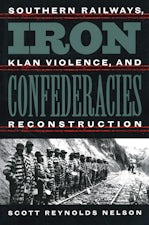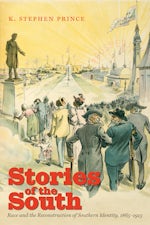Ku-Klux
The Birth of the Klan during Reconstruction
By Elaine Frantz Parsons
400 pp., 6.125 x 9.25, 10 halftones, 4 figs, notes, bibl., index
-
Paperback ISBN: 978-1-4696-5213-9
Published: February 2019 -
E-book EPUB ISBN: 978-1-4696-2543-0
Published: November 2015 -
E-book PDF ISBN: 979-8-8908-4960-1
Published: November 2015
Buy this Book
- Paperback $39.95
- E-Book $19.99
For Professors:
Free E-Exam Copies
Awards & distinctions
2016 Willie Lee Rose Prize, Southern Association for Women Historians
Shedding new light on the ideas that motivated the Klan, Parsons explores Klansmen's appropriation of images and language from northern urban forms such as minstrelsy, burlesque, and business culture. While the Klan sought to retain the prewar racial order, the figure of the Ku-Klux became a joint creation of northern popular cultural entrepreneurs and southern whites seeking, perversely and violently, to modernize the South. Innovative and packed with fresh insight, Parsons' book offers the definitive account of the rise of the Ku Klux Klan during Reconstruction.
About the Author
Elaine Frantz Parsons is professor of history at Kent State University.
For more information about Elaine Frantz Parsons, visit
the
Author
Page.
Reviews
"Extraordinarily well-researched. . . .interesting and illuminating."—Pittsburgh Post-Gazette
“A superb, important new interpretation of the history of the first Ku Klux Klan. . . . Highly recommended for those interested in the history of the South, Reconstruction, and American racial violence.”—North Carolina Historical Review
“Provides an interesting and insightful view of how the Klan phenomenon was portrayed in different venues and by different kinds of actors.”—American Historical Review
“As much a cultural history as it is an institutional history, a refreshing departure from a vast literature that has long cataloged the political, social, and economic implications of Reconstruction violence.”—Journal of the Civil War
“A provocative reevaluation of the Ku Klux Klan that is essential reading for anyone studying the Reconstruction South.”—Journal of Southern History
“Essential reading for scholars focusing on the Civil War, Reconstruction, or racist violence in America.”—H-Net Reviews
Multimedia & Links
Follow the author on Twitter @ProfEFP.



